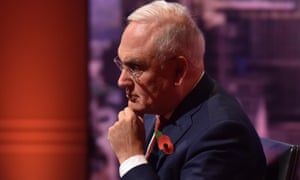
Vulnerable pupils with challenging behaviour are being offloaded by schools that move them into inappropriate alternative settings with inexperienced staff who are not equipped to deal with them, according to the chief inspector of schools.
Sir Michael Wilshaw, the head of the schools watchdog Ofsted, said he did not oppose the use of alternative provision – often available to pupils who are on the verge of being excluded – but called on schools to “take ownership” of it.
Ofsted fears that some pupils are being placed in unregistered or illegal schools, which are offering alternative provision that can cost £25,000 a year per pupil. Wilshaw, interviewed by the BBC, accused some people in the sector of “lining their pockets” while offering inadequate provision to at-risk children.
“You have this combination of inexperienced staff, not really qualified to deal with difficult behaviour, and with youngsters on the edge of all sorts of trouble,” said Wilshaw. “That could lead to serious problems in our society.”
“I’m not against schools using alternative provision,” he added, “as long as they take ownership of it.”
A recent Ofsted investigation found that though schools are now more aware of their responsibilities when choosing alternative provision for a pupil, they still lack clear guidance regarding safeguarding.
Sean Harford, Ofsted’s director of education, said at the time: “These are some of the most vulnerable children in the education system and the school is responsible for ensuring their personal and online safety while they are off site, as well as the quality of the education provided.”
A specialist Ofsted taskforce has been carrying out a crackdown on illegal schools, with inspectors discovering children being educated in “unsafe and unhygienic premises” by staff who have not been properly checked.
According to the BBC, Ofsted inspectors investigated 162 suspected illegal schools last year of which 32 were centres run by either charities or businesses for children excluded from school, or at risk of exclusion.
John Pugh, the Liberal Democrats’ education spokesperson, said: “The practice of pushing pupils with behavioural problems out of their schools is bad enough, but to send them to inadequate, illegal institutions is truly shocking.
“This practice leaves vulnerable young people in risky, and potentially unsafe situations. We need urgent answers from the government about how they and Ofsted will be cracking down on these institutions and ensuring children with behavioural problems get the education and additional support that they need.”
There are also concerns among Ofsted inspectors about the rules governing home education. There is no legal obligation for parents to send their children to school – they can be withdrawn and registered as home educated – but they have to provide a “suitable education”.
Ofsted is concerned that local authorities lack the powers to check the education being provided. Some children slip under the radar entirely as they never start school so are not registered as home educated.
“It seems bizarre to me that a parent can simply take their child out of school and not register that child with the local authority,” Wilshaw told the BBC. “It seems bizarre to me that the local authority has absolutely no powers to go and find out what’s happening to children who do not go to mainstream schools, who are being educated at home.
“It seems not just bizarre but dangerous that they cannot investigate what’s happening to these children. The whole issue of home education and the very lax rules around home education need to be tightened up.”
The Department for Education has previously said steps are being taken to ensure the system is as robust as it can be when it comes to protecting young people, while at the same time safeguarding the rights of parents to determine how and where to educate their children.
The NSPCC said on Tuesday it was concerned about the reported growth in the number of illegal schools. According to the law, anywhere that has more than five children full-time, or one child with special needs, has to register as a school.
A spokesperson for the child protection charity said: “Every child should be safe when they go to school, and the apparent rise in these institutions which are not properly registered is very troubling.
“Illegal schools are likely to lack the vital safeguarding standards needed to protect children. They could be providing substandard education, or employing staff who haven’t had the proper background checks or safeguarding training. Parents cannot be certain that these ‘schools’ have passed rigorous checks that ensure their child’s safety is a top priority, making them potentially dangerous places.”
[Source:-The Guardian]
